Brothers Of Soul - Feature prior to the 22nd Oct 2011 UK Show
the Brothers Of Soul story
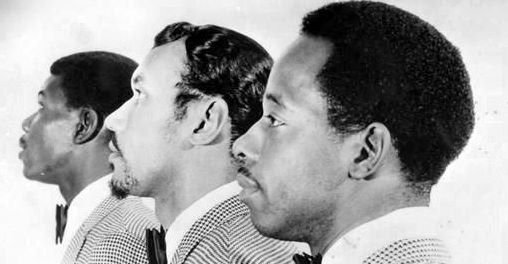
The BROTHERS OF SOUL (Fred Bridges, Richard Knight, Ben Knight and Bobby Eaton) will be performing in Britain, for the first time ever, on October 22nd 2011 at the Caribbean Centre in Coventry with full orchestral accompaniment. This is their only UK concert.
The group will be performing many of their own recordings as well as songs they wrote for other artists. The evening will be a celebration of Detroit’s important contribution to the rare soul scene and will only feature music recorded in the Motor City.
In recognition of this essential event, we are proud to resurrect this 2008 article about the group, highlighting the early careers of group members, the vast catalogue of songs they wrote and the important contribution they made to the music scene.
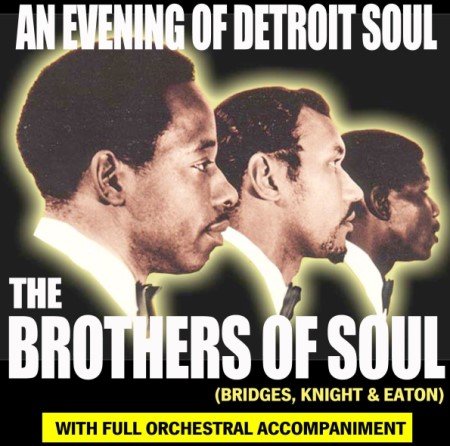
Harmony singing has been an important aspect of black expression and communication since the primeval days in Africa prior to the introduction of the slave trade. Communal choral involvement accompanied the misery and suffering experienced by slaves throughout the entire despicable process of enforced labour and identity assassination. Yet, the practice of mass participation in vocalizing, as practiced in churches by choirs and congregations or through a cappella entertainment by smaller groups, in the 19th century, became a pre curser for many of the established art forms we recognize today. Barber shop quartets, impromptu so called ‘street corner’ singing, gospel groups and family gatherings are all examples of situations that contributed to the veritable explosion of group harmony singing that evolved during the 1950s. The phenomenon known as ‘Doo Wop’ began to dominate popular tastes throughout America, during most of the decade. It created a musical template of intricate four and five part harmonies, often with falsetto leads and bass voice histrionics, performed by slickly suited groups of males, who blended the charisma and raw power of rhythm and blues with the urbane sophistication of collective crooning. By the early 1960s the format had evolved into a less restrictive style as groups like The Impressions, The Temptations, The Dells (who had been a part of the ‘Doo Wop’ era) and The Drifters, and many others, delivered more melodic expressions of musical syncopation, retaining the harmonization of the past, but with a greater emphasis on lyrical and emotional content. In most cases, groups were dependent on songwriters providing material for them. They tended to concentrate on the delivery and performance of a repertoire of songs, whereas the songwriters focused on the lyrical and melodic components – and rarely did the twain ever meet. Until a talented vocalist named Fred Bridges met Robert Eaton and Richard Knight, and began songwriting collaboration in Detroit during the mid 1960s that ultimately resulted in the creation of a singing group of their own – The Brothers of Soul.
Fred Bridges completed a stint in the military in 1960. “I was part of a group called The Crystals. We won all the Air Force talent shows but when I left the service, the group folded. I’d always been into music – I could sing and play piano too. And I grew up with Marv Johnson and Lawrence Payton of the Four Tops so I had some connections.” His friendship with Johnson resulted in an introduction to producer Robert (Bob) Bateman in 1961, who took him to the local Speciality in Detroit to record the self-penned ‘Baby don’t you weep’ b/w ‘It must be love’ for Versatile Records. With little promotion, the record was unsuccessful. Bridges was undeterred however. “It was a good learning experience for me. I recorded again a couple of years later as Lavon Bridges on a tune called ‘With a smile on my face’ for Gloreco, which I wrote, but that didn’t do too well either. I was trying to get into the recording scene here in Detroit and I did a couple of things. I remember doing backbeats on Edwin Starr’s ‘Agent double O soul’ over at Golden World with this clapper device that we made by attaching a hinge between two pieces of wood. I was over at Motown too when they needed some voices on a Martin Luther King song they were doing.” But it was his songwriting that drew most attention - and some controversy. “ Johnny Terry used a song I had written with Richard Beasley called ‘She broke his heart’ on one of his artists (Just Brothers) but when it was released he had the writer as Freddie Pride. He never told me he was gonna do it or why!” The song was included by noted UK scribe Dave Godin on his album of the best 20 ‘Deep Soul’ sides ever written and recorded. By 1964 Bridges began working at the Chrysler assembly plant but continued his interest in the music business. He met Richard Knight at the plant and soon realized that they shared a passion for songwriting. Knight’s career path to this point couldn’t have been more different to Bridges’. He recalled his tempestuous late teenage years. “I guess you would have called me a street hoodlum at that time -17 or 18 years of age. I moved to New York City when I was 18 and got a job there. One of my co-workers’ uncles died and left him a nightclub and he invited me to help him run it. I didn’t know too much about organising things but he had heard me sing and hired me to sing with the band. I did that for four years.” The success of Motown Records, and the frenzy of related activity that accompanied it, back in Detroit, soon lured him back home though. “My buddies kept calling me and telling me what was going on and that if I wanted to get into the business, Detroit was the place to be. I came back around ’64 and got a job at Chrysler. I met Fred not long after that.” Bridges was to be the catalyst in the inclusion of Robert (Bobby) Eaton into the eventual writing triumvirate too, as Eaton himself remembered. “I’d been into music since I was a kid. I was in a group called The Tornadoes with Stanley Mitchell back in ’58. We recorded a couple of sides in Chicago for Chess Records but nothing came of it. I got a break in early ’64 when Tri Sound Records used a couple of my songs on a group called The Devotions (‘Same old sweet feelin’ b/w ‘Devil’s gotten into my baby’) It was around that time I met Fred and Richard and we started writing together.”
Fred Bridges and engineer Ed Wolfrum mixing 'Candy' at Tera Shirma
Bridges recalled how the creative process worked between them “Richard was really good with words. Bobby was an accomplished songwriter in his own right but was really great at arranging voices and doing the background parts. I would usually start things off on the piano with a hook or some kind of a groove and we would go from there.” Their first collaborations took place in a small studio not far from Motown’s Hitsville site. “It was around the same time that we got hooked up with Lou Beatty at La Beat Records. I was walking past their studio. It had these really big windows at the front and I could see right in. They were working on something, playing piano and such, so I went in and met the engineer. I played him and Lou Beatty some songs I’d got on the piano, and they liked them. Richard and I went back and they hired us as songwriters. Bobby came too. We did six songs on a guy called Al Williams, though only one single got released.” ‘I am nothing’ didn’t sell well when it was released on LaBeat but achieved legendary status and popularity on the British rare soul scene and is a prized possession among collectors, who will pay well into four figures to acquire a copy. Bridges acted as a talent scout for LaBeat on occasion too. “Yeah, I was going into LaBeat and heard this group of guys singing nearby. They called themselves The Masqueraders. They had come up from Dallas to audition for Motown but had been turned down. I took them in to Lou who really liked their style. He signed them and put them up in a motel he owned down the street too. We cut several sides on The Masqueraders including ‘I got the power’ and ‘One more chance’.” Bridges, Knight and Eaton also wrote songs for Mutt Records, which operated out of Inkster, a western suburb of Detroit, around the same time. “We wrote a couple of tunes for The Two Fellows and The Majjestees. There was a guy called Nate Dorr who owned the label. He was a bond bailsman. He put us in touch with Bill Craig who was well connected in the music business. He liked our material and took us to Sidra Records ‘cause they wanted some songs for The Precisions That would have been around 1967.” Erstwhile session drummer George McGregor had been hired as musical director at Sidra and wasted no time in bringing in Jo Armstead and arranger Mike Terry to work on various projects. “We met Mike and Joshie at that time and wrote some songs with them that were later recorded by Carl Carlton with Terry producing. ‘Drop by my place’ and ‘Two timer’ were two of our songs I recall. Mike had been a session sax player at Motown, Golden World and other studios around town for years, but he had moved into arranging and he was the best around. We used him on most of our sessions because he could transform and enhance our ideas so brilliantly.”
Yet it was a chance meeting with a visiting label owner that determined the immediate future of the trio. Bridges remembers it clearly. “ Ric Williams was visiting Detroit from Chicago. He had made his money in other areas but wanted to get into the record business. He had started several labels ( Boo, Zodiac, Shock and Aquarius ) and had his own artists, - people like Candace Love, Chuck Bernard and Ruby Andrews but he needed songs. He came into Sidra and heard a couple of the songs we had written for the Precisions. He was really impressed and asked us to write for his artists.” Their first assignment was with Ruby Andrews, who recorded numerous Bridges/Knight/Eaton compositions including the sublime ‘Just loving you’, a perennial favourite on Britain’s soul scene, and her first hit ‘You made a believer out of me’. Candace Love and Chuck Bernard were the beneficiaries of their songs too, but it was their working style that caught the attention of Ric Williams and led to a significant change in their fortunes. Fred Bridges, “Things started to move pretty fast at that point. Ric heard us rehearsing and teaching our songs to his artists and really liked our singing style. He convinced us to record as a trio, but we didn’t really have a name so he released us doing two of our own songs ‘Footsteps’ and ‘A dream’ as The Creations on the Zodiac label. Later on we named ourselves The Brothers of Soul and recorded for the Boo label.” The group was augmented, on occasion, by Ben Knight (no relation to Richard) who would replace any member indisposed or unavailable. In early 1968 ‘Hurry don’t linger’ was released by The Brothers of Soul, followed by their only national hit ‘I guess that don’t make me a loser.’ For the next two years the group wrote and produced themselves on a string of beautifully delivered songs, masterfully arranged by Mike Terry, yet also found the time to create for others, as Bridges explained. “Mike was recruited by Epic Records and came to us for songs when he worked with certain artists. We gave him ‘Wish I had known’ for Sandra Phillips, ‘Gone but not forgotten’ for Johnny Robinson and helped him with the Maxine Brown and Rhetta Hughes albums.” Two of their songs, ‘Plum outta sight’ and ‘Seems you’ve forsaken my love’ appeared on Maxine Brown’s solitary Epic album but created some friction at the time of their original introduction to the artist. Richard Knight recalled what happened. “Before an artist recorded any of our songs I always made sure that they would sing it the way we had written it. We didn’t mind some changes or improvements, as long as we approved them. Let’s just say that things were going in a direction on this session that I didn’t like so I made sure the songs were sung to our satisfaction.”
The Brothers of Soul created a body of work that has stood the passage of time and sounds as fresh, vibrant and original as the moment it was recorded. Ironically though, the smooth harmonies and heartfelt romanticism of their material was born in a turbulent time in Detroit, as Bridges recalled, “ Our first records were cut during the riots. There were looters and rioters around and shooting going on. We had to dodge and duck around the streets to get our tape recorders to the studio so that we could record. There was a curfew too, which it made it tough to get back home at night. We actually came up with our group name around that time. People would write ‘Soul brother’ on their windows of their houses and businesses to protect them from being burned down by rioters, and we just adapted it.” The group produced a variety of soulful recordings ranging from up-tempo tunes like ‘I’d be grateful’ and ‘Come on back’, which still pack dance floors at soul music gatherings around the world, along with poignant ballads like ‘Try it baby’, ‘You better believe it’, ‘Hurry don’t linger’, ‘One minute baby’ and ‘A dream’ which retain the emotional vulnerability and sensitivity of true musical communication.
The harmony found in their singing extended to the personal interaction that has now lasted, between group members, for over forty years. They truly are - The Brothers of Soul.
Rob Moss


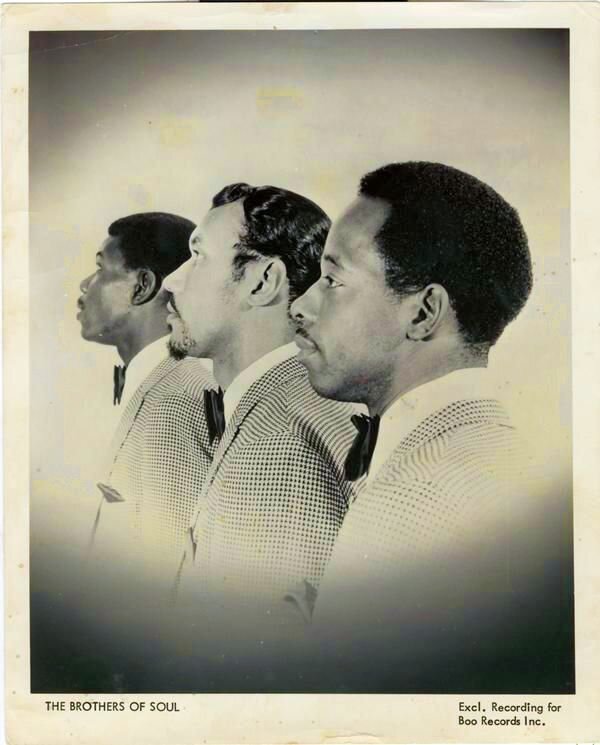
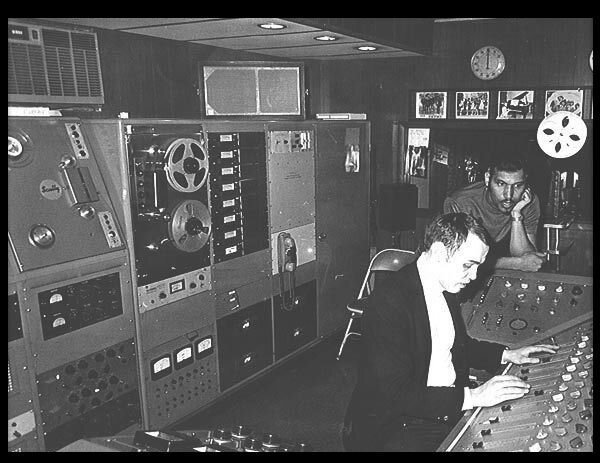
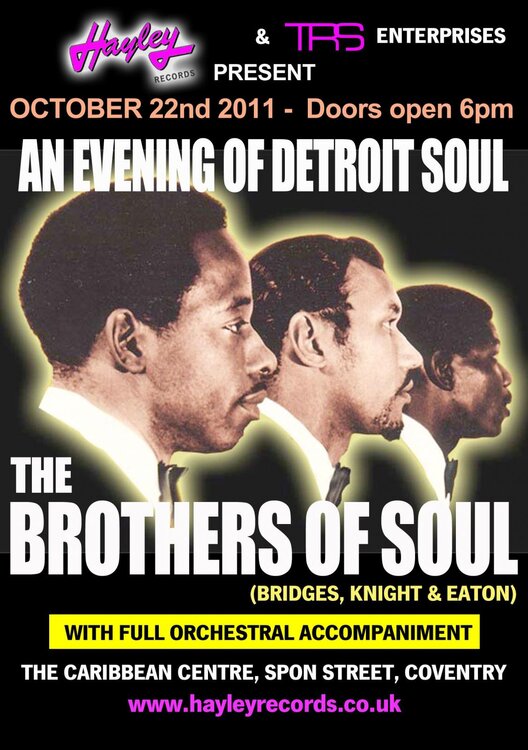
Recommended Comments
Get involved with Soul Source
Add your comments now
Join Soul Source
A free & easy soul music affair!
Join Soul Source now!Log in to Soul Source
Jump right back in!
Log in now!